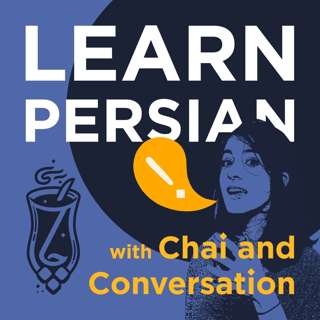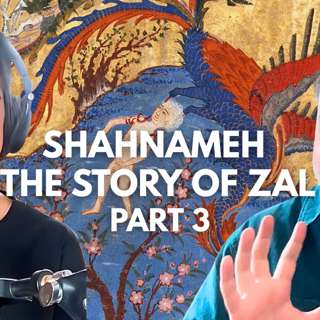
Speak Lesson 14 | How to Talk About Places Around Town, and Possession
In this Persian / Farsi lesson, we learn how to talk about possession. We start the lesson by learning the example of a house (khooné). To say 'my house', you simply say 'khooneyé man'. In order to talk about possession, we have to learn the different words for groups of people, which are:me: manyou (informal): tōyou (formal): shomāour: mātheir: ānhāhis/her: eeshoonWe then learn to ask who owns a certain belonging, and then learn the vocabulary words for different places around town.KEY CONCEPTS:PossessionHow to ask who owns somethingVocabulary for places around town
18 Aug 201117min

Speak Lesson 13 | How to Host or Be Hosted (especially when it involves chai)
in this lesson, we are going to cover the concept of being hosted, either at someone's house or at an establishment. Iranians love to host people. For instance, when you visit someone of Persian decent at their home, they will most likely immediately offer you tea. So in this lesson we learn vocabulary that is associated with hosting or being hosted, including the names of different beverages, and how to offer things to guest or accept offerings. KEY CONCEPTS: Names of beverages you'll be offered in an Iranian household (hint, chāi is at the top of the list) The names of alcoholic beverages How to offer something when you are hosting How to accept or decline an offer when being hosted Some polite vocabulary such as thank you (merci) and please (lotfan)
4 Aug 201114min

Speak Lesson 12 | More Numbers, and the Months, Days and Seasons
In this Persian / Farsi, we go beyond numbers one through twenty and learn how to say ALL the numbers. In addition, we learn the Persian words for the months of the year, the days of the week, and seasons. This is a very vocabulary rich lesson, so it might take some practice to get all the words commited to memory!KEY CONCEPTS:All numbers and how to put them togetherThe Persian days of the weekThe months of the Western calendarThe seasonsOrdinal numbers (first, second, third, etc.)How to say the date
15 Juli 201117min

Speak Lesson 11 | How to Speak About the Languages You Know
When talking to someone in something other than your native language, it sometimes helps to know what other languages they speak. This not only helps you to learn more about a person, but can also potentially give you insight into other things you have in common with them. In this Persian / Farsi lesson, we learn how to talk about the languages we can speak, learn the words for different languages, and learn to speak about the proficiency with with we speak certain languages. Also, importantly, we learn how to tell people to slow down if they're speaking too fast for us to understand.KEY CONCEPTS:Telling others which languages we can speakTelling others the proficiency with which we can speak those languagesThe names for different popular languagesAsk others to slow down when speakingAsk others how to say something in Persian
9 Juni 201112min

Speak Lesson 10 | Review of Unit 1!
This is the last lesson in ‘Unit 1′ of Learn Persian with Chai and Conversation. In this lesson, we review all the materials learned before, and learn some extra vocabulary that will help you to communicate effectively in the Persian language! Congratulations on reaching the end of ‘Unit 1′! The bonus materials of this lesson include exercises in which you can review your knowledge of what we've learned so far.
3 Juni 201117min

Speak Lesson 9 | How to Use Question Words, More Family Vocabulary, and a Few Filler Words and Phrases
In Iranian culture, family is extremely important. Instead of having just one Persian word for 'aunt' for instance, we have two- there is a different word for the sister of your father (amé) versus the sister of your mother (khālé). So when referring to one or the other, people know exactly whether you are speaking of your maternal or paternal aunt. Similarly, while there is only one word for 'cousin', in Persian there are eight different words for cousin depending on whether they are female or male, or whether they are on your mother or father's side of the family. This might seem complicated, but once you get the hang of it, it makes figuring out who a given person is referring to quite easy! In this Persian (Farsi) lesson, we go over all the different words for extended family. These will be very useful when talking to Iranians, because, as we've said, family is extremely important in Iranian culture. In addition, we learn the most important question words to help you form useful questions when having conversations. Questions are a useful tool for getting to know someone, and these question words will allow you to form many different sentences using the vocabulary we've learned so far. The questions words we go over in this lesson are:Who WhenWhereWhatHowWhichWe also learn some key questions you can form using these words including: Where are you?What do (would) you like?How's it going?Who is this?Why not?How many?How?Where is it?How much? At this point of Chai and Conversation, you'll be amazed by how much you can understand of casual Persian conversations.
27 Maj 201113min

Speak Lesson 8 | How to Talk About Your Likes and Dislikes
In this Persian (Farsi) lesson, you learn to talk about your likes and dislikes. Also, we will be learning the Persian sound ‘gh’. There are two sounds in the Persian language that you don't hear in English. The first is the sound 'kh' heard in words such as 'khoobam'- we went over this in Lesson 1. The second is the sound 'gh' which we'll be going over in this lesson. We learn it specifically to learn the word for music, or museeghee in Persian. The phrases covered in this lesson will allow you to say whether or not you: like your job like chocolate like nature like sports like music Or, whether you like specific figures such as Charlie Chaplin. In order to learn how to say that you like a specific person, we have to learn about the 'direct object marker', the sound rā which has no direct translation in the English language. We also go over talking about what you like to do. The phrases we learn with regard to this are: I like to watch moviesI like to read booksI like to exerciseI like to eat chocolateI like to learn PersianWe also learn to speak about these in the negative sense, and say that we don't like to do certain things.
9 Maj 201114min

Speak Lesson 7 | How to Talk About Your Job and Where You Work
In this Persian (Farsi) lesson, you learn how to talk about your job, say where you work, and whether or not you like your job. We learn vocabulary for a long list of jobs, including: student engineer lawyer writer architect accountant cook waiter dentist pilot artist We then learn how to combine these words into the phrase saying what we do and asking others what they do for a living. Again, very useful phrases for making casual conversation with others to get to know them better. We also learn how to say whether or not we like our jobs, and to ask others if they like their jobs as well. We then learn the vocabulary for different places you could work. These include:RestaurantHospitalFactoryOfficeNot all people work, however. So we also learn the following Persian phrases:I workI don't workI am joblessI am retired
27 Apr 201113min






















